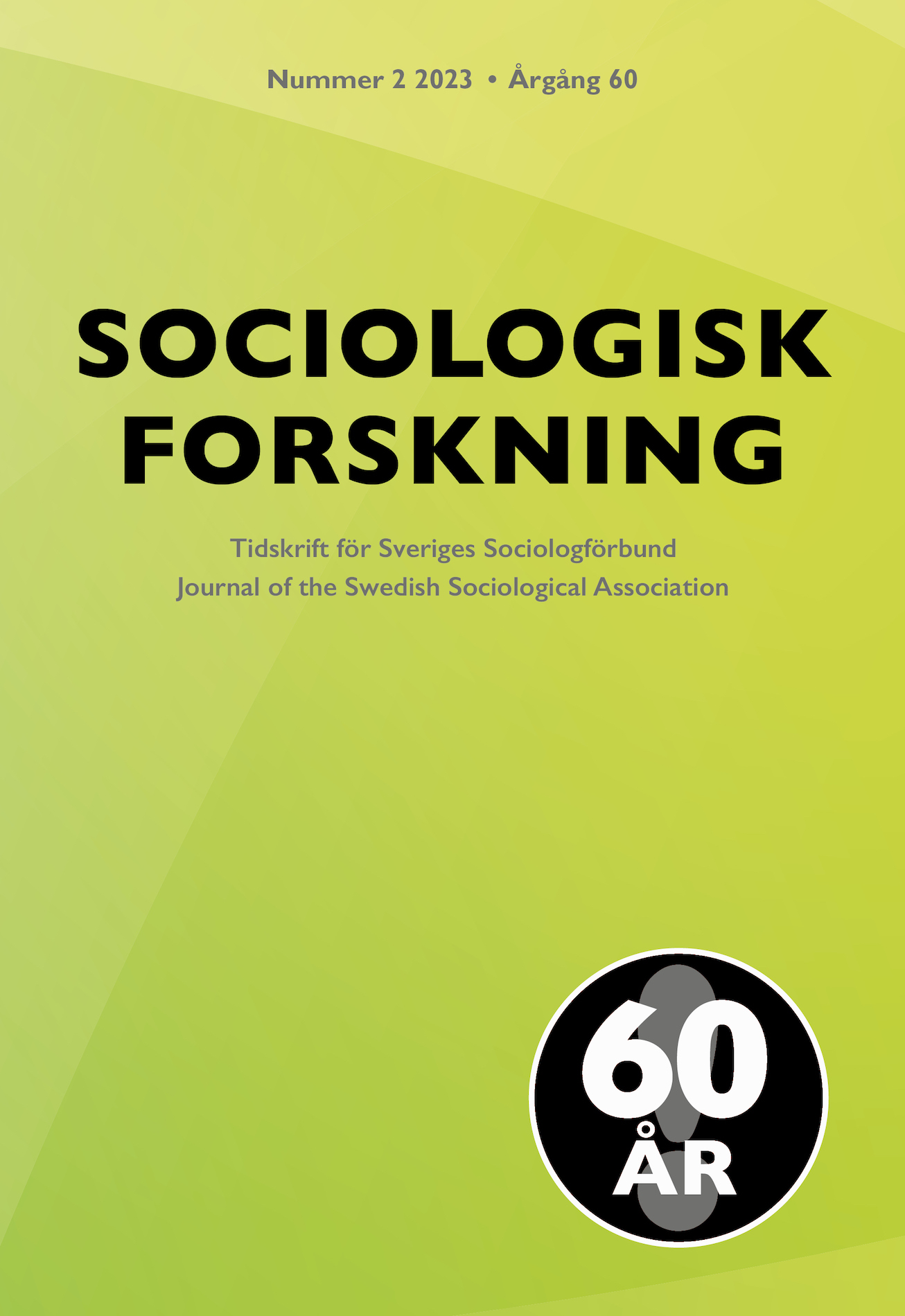Populism’s four driving emotions, and how to cultivate emotions supporting democracy
An interview with Eva Illouz
DOI:
https://doi.org/10.37062/sf.60.25491Nyckelord:
emotions, populism, democracy, reflexivityAbstract
We are delighted to present this interview with world renowned sociologist Eva Illouz. She currently holds the position of Directrice d'Etudes at the École des Hautes Études en Sciences Sociales in Paris and is the Rose Isaac Chair in Sociology at the Hebrew University of Jerusalem. Her research focuses on the interlinkages between capitalism, emotions, gender, culture, love, sexuality, and freedom in the modern world.
This interview primarily centers around Illouz's latest book but also touches on the role of social media in propagating negative emotions, strategies for cultivating emotions such as fraternity and hope to sustain modern democracy, and the contemporary era marked by societal self-destruction and unprecedented catastrophes.
Referenser
Bell, D. (1976) The cultural contradictions of capitalism. New York: Basic Books.
Berlant, L. (2011) Cruel optimism. London: Duke University Press
Bhabha, H. (1994) The location of culture. London: Routledge.
Brady, W. J., Wills, J. A., Jost, J. T., Tucker, J. A., & J. J. Van Bavel (2017) Emotion shapes the diffusion of moralized content in social networks, Proceedings of the National Academy of Sciences, 114 (28):7313-7318. http://doi.org/10.1073/pnas.1618923114
Durkheim, E. (1915) The elementary forms of religious life. George Allen & Unwin Ltd.
Engdahl, E. (2020) Capitalist society as an analysand: an interview with Eva Illouz, Emotions and Society, 2 (1):13–20. http://doi.org/10.1332/204378920X15784918589019
Haidt, J. & T. Rose-Stockwell (2019) The dark psychology of social networks. Why it feels like everything is going haywire. The Atlantic (December).
Halpin, D. (2001) The nature of hope and its significance for education, British Journal of Educational Studies, 49 (4):392–410. http://doi.org/10.1111/1467-8527.t01-1-00184
Hermansson, K. (2023) Emotional expressions in the Swedish discourse on crime: A comparison of the 2018 Moderate and Social Democratic election campaigns, Sociologisk Forskning, 60 (1):33–55. https://doi.org/10.37062/sf.60.24779
Illouz, E. (1997) Consuming the romantic utopia: Love and the cultural contradictions of capitalism. Berkeley: University of California Press.
Illouz, E. (2007) Cold intimacies: The making of emotional capitalism. Oxford: Polity Press.
Illouz, E. (2012) Why love hurts: A sociological explanation. Oxford: Polity Press.
Illouz, E. (2019) The end of love: A sociology of negative relations. Oxford: Oxford University Press.
Illouz, E. (2023) The emotional life of populism: How fear, disgust, resentment, and love undermine democracy. Oxford: Polity Press.
Kahneman, D. (2011) Thinking, fast and slow. New York: Farrar, Straus and Giroux.
Le Bon, G. (1895) The crowd: A study of the popular mind. London: Transaction.
Markovits, D. (2019) The meritocracy trap: How America's foundational myth feeds inequality, dismantles the middle class, and devours the elite. New York: Penguin Press.
Nussbaum, M. (2015) Political emotions. Why love matters for justice. Cambridge: Harvard University Press.
Nussbaum, M. (2018) The monarchy of fear. New York: Simon & Schuster.
Pew Research Centre. (2017) Critical posts get more likes, comments, and shares than other posts. https://www.pewresearch.org/politics/2017/02/23/partisan-conflict-and-congressional-outreach/pdl-02-23-17_antipathy-new-00-02/
Poder, P. (2022) The end of contemporary love life?, Emotions and Society, 5 (1):100–119. http://doi.org/10.1332/263169021X16528868423539
Tarde, G. (1969) On communication and social influence: Selected papers. Chicago: University of Chicago Press.
Downloads
Publicerad
Referera så här
Nummer
Sektion
Licens
Copyright (c) 2023 Poul Poder, Marcus Persson

Detta verk är licensierat under en Creative Commons Erkännande-Ickekommersiell-IngaBearbetningar 4.0 Internationell-licens.
Allt material i Sociologisk Forskning publiceras med omedelbar öppen tillgång (open access), under Creative Commons-licensen CC BY-NC-ND 4.0.
Allt innehåll i tidskriften är fritt tillgängligt utan kostnad och får för icke-kommersiella syften fritt läsas, laddas ned, kopieras, delas, skrivas ut och länkas. Innehållet får dock inte ändras. När innehållet används måste författare och källa anges. Upphovsrätten till innehållet tillhör respektive författare. Inga publiceringsavgifter tas ut.





